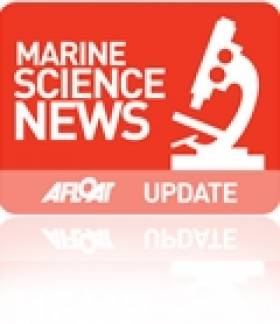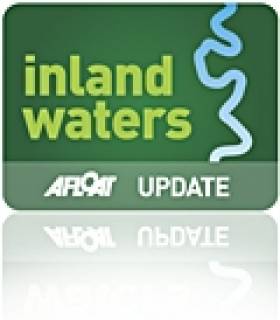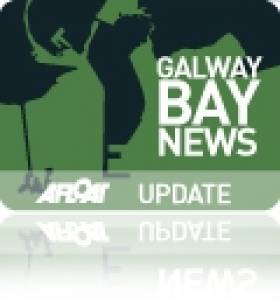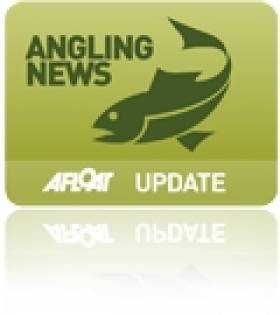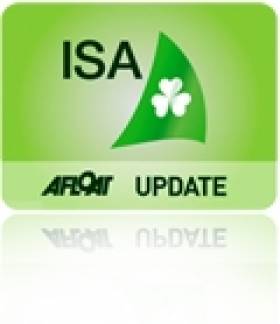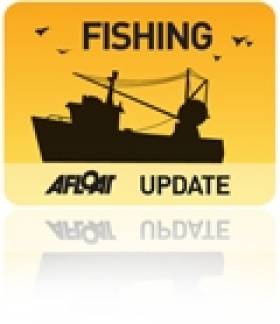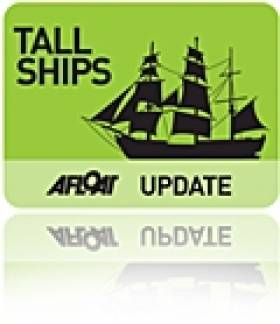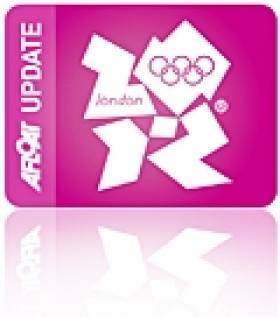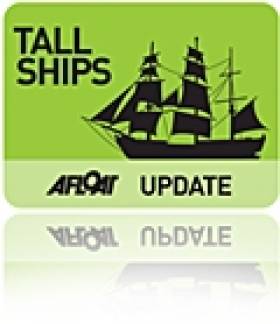Displaying items by tag: Funding
Marine Institute To Be Centre of Global Marine Research
#MarineScience - Galway Bay FM reports that the Marine Institute in Galway is to become one of the world's leading marine research centres.
The news comes in the wake of a groundbreaking deal signed in Galway on Friday afternoon (24 May) between the EU, the US and Canada to join forces on Atlantic Ocean research, as previously reported on Afloat.ie.
All partners have agreed to commit to funding to study the interplay of the Atlantic with the Arctic Ocean, and discover ways that research on the oceans and marine wildlife can contribute to scientific advances in other areas.
Meanwhile, a monitoring system for waste waters is among the projects that will benefit from a near €1 million in funding from the Science Foundation.
Research Minister Seán Sherlock announced the funding for projects at NUI Galway that is hoped to deliver "commercialisation of research in a range of areas".
#InlandWaterways - Minister Fergus O'Dowd today (3 May) helped launch a new pilot scheme by Inland Fisheries Ireland (IFI) through which angling clubs and organisations can access funding to undertake sustainable development works in the Midland Fisheries Group permit area.
The Midland Fisheries Fund has an initial allocation of €50,000 which has been created from angler contributions set aside from the permit income received by IFI in the Midlands Fisheries Group area. The scheme, which is similar in design to the Salmon Conservation Fund, will allow for habitat improvement but importantly also includes angling development projects in Midlands waterways.
Successful applications will be provided with technical assistance to help them become reality and will foster links between the fishery owners, State agencies and land owners.
The application process itself, says IFI, "will instill confidence in project promoters who are often apprehensive due to the complicated nature of forms and permissions".
The scheme is exclusive to the Midland Fisheries Group area and is only open to clubs in that area.
Minister O'Dowd said at the launch: "This fund reaffirms IFI’s objective to facilitate stakeholders to undertake sustainable development works. These works will enhance and improve fisheries habitats and angling tourism potential and the contribution the inland fisheries resource makes to the economy."
The minister - who is currently undertaking a public consultation around the country in relation to the review of fisheries legislation - said he was encouraged by the angling stakeholders' enthusiasm, knowledge and interest in protecting, managing and developing the resource.
"This scheme encapsulates the partnership approach between IFI and its stakeholders, ensuring projects are environmentally sustainable, undertaken with the appropriate permissions and guidance and developed by local angling clubs for the benefit of locals and tourists alike," he said.
An information evening on the Midland Fisheries Fund will take place in Lough Owel Angling Centre on 14 May at 6.30pm.
Application forms for the fund are available online HERE. The closing date for receipt of application forms is 15 June 2013.
Meanwhile, the North South Ministerial Council (NSMC) has backed an initiative for the Loughs Agency to support the Carlingford Oyster Festival this August.
The Aquaculture and Marine sectoral meeting held in Carlingford this morning was attended by Minister for Natural Resources Pat Rabbitte, NI Minister for Rural Development Michelle O’Neill, Minister Fergus O’Dowd and NI Minister Nelson McCausland, who were all keen to endorse the proposals of the Loughs Agency to support the festival.
Taking place from 8-11 August, the festival has been developed by the Carlingford Cooley Tourism Association as a family-oriented event that showcases locally produced oysters and seafood. The agency will work in partnership with the local festival organisers on the annual event which attracts large numbers of visitors to the Carlingford area.
Minister O'Dowd said the festival “offers a real opportunity to showcase local produce and bring an international focus on Carlingford Lough as a production area of distinction for excellence seafood."
The ministers were also keen to emphasise that the tourism and visitor potential of the lough area should also benefit from a strong and vibrant oyster festival featuring as an attractive occasion on tourism and event calendars across the island and internationally.
Irish Harbours Get €7.4m Funding for Remedial Works
#IrishHarbours - Funding of €7.4 million for urgent remedial works at six regional harbours has been announced by Minister for Transport, Tourism & Sport Leo Varadkar.
The funding will pay for repairs and safety works on essential harbour infrastructure, and is likely to benefit the local economy, promote leisure activities and support the fishing industry.
“This funding will allow essential works at these regional harbours on piers, walls and harbour structures," said the minister. "This work is necessary as part of their transfer from central Government to local authority control.
“Harbours play an important role in their communities in terms of fishing, cargo and leisure and play an increasingly important role in tourism and watersports."
Minister Varadkar added: "The large-scale safety or construction projects planned for Kinsale, and for Baltimore & Skibbereen Harbour this year will be able to go ahead thanks to this funding. Smaller scale projects at other harbours can also proceed, including essential works at Arklow Harbour.”
The funding has been allocated to the following harbours:
Arklow - €3,588,000
Baltimore & Skibbereen - €1,165,000
Bantry Bay - €100,000
Kinsale - €1,467,000
Tralee & Fenit - €750,000
Wexford - €329,500
The funding has been concentrated on remedial works to ensure that the harbours are in a fit condition during their transfer to local authority control.
Twelve of the 13 regional harbours have transferred to date, with 11 being taken over by local authorities, and one designated a fisheries harbour.
Galway Ironman Triathlon Cancelled Due To Funding Issues
#GalwayBay - Funding issues have resulted in the cancellation of what would have been the third annual Ironman 70.3 triathlon in Galway later this year, as the Galway City Tribune reports.
Organisers have expressed their sorrow at having to call a halt to the event, which already had some 1,600 people registered to take part, due to what they claim is a lack of funding from Fáilte Ireland.
“I think it’s ironic that we have to turn people away when ‘The Gathering’ is on,” said co-organiser Eoin McCormack.
The most recent Galway Ironman 70.3, staged in August 2012, overcame local swimming ban concerns to see more than 2,000 athletes swim 1.9km along the Salthill Promenade before a 90km cycle through Connemara and a 21.1km run through the streets of Salthill and The Claddagh.
It's estimated that the inaugural event in 2011 was worth more than €10 million to the local economy.
The Galway City Tribune has more on the story HERE.
IFI Launches 2013 Angling Sponsorship and Salmon Conservation Schemes
#ANGLING - The Inland Fisheries Ireland (IFI) annual Sponsorship Scheme for 2013 is now open for applications.
There are some changes to the scheme for 2013, with biosecurity and catch and release conditions "safeguarding Ireland’s wonderful inland fisheries and sea angling resources".
Prizes may be sponsored under the scheme, but must be fishing tackle or angling-related in order to support those providing a service to Ireland's estimated 500,000 anglers.
The scheme is open to federations, clubs, individuals, youth groups, commercial salmon sector, etc who in the past have gained sponsorship for competitions, angling lessons, heritage projects and international, national and local events, all of which promote some or all of the following: inland fisheries, recreational angling and conservation.
Minister Fergus O'Dowd welcomed the scheme, saying: “Angling, and Ireland’s wonderful fisheries are there for all to enjoy. IFI, by supporting such activity is empowering individuals and organisations to boost their local economies, teach all ages and abilities to fish, have a hobby for life, and helping protect and sustain our fisheries resource into the future.”
Full details of the scheme are available on the IFI website and the closing date for receipt of applications is 15 January 2013.
Meanwhile, Minister O'Dowd has also announced the opening of the 2012-13 Salmon Conservation Fund Contributors Scheme, which has an initial allocation of €200,000 available for projects which help in the conservation of wild Atlantic salmon.
Applications are invited from clubs, fishery owners, individuals and commercial salmon fishermen who have contributed to the fund by 15 March 2013.
According to IFI, the scheme - which was run on a pilot basis for the previous two years - has been a success to date, with projects from all over Ireland awarded funding.
Applicants work with IFI to agree projects and many have been successful in securing additional LEADER funding.
The minister commented: “I never cease to be impressed by the work enthusiastic, passionate anglers and individuals can get done, ensuring that our natural resource is conserved and protected for future generations.
"The long term effect will ensure biodiversity and improved stocks of salmon from which Ireland can derive economic benefit through recreational angling, and commercial exploitation in years to come.”
Details of the scheme can be downloaded from the IFI website HERE.
ISA To Receive Sports Capital Programme Funding in 2012
#ISA FUNDING - The Irish Sailing Association will receive a special allocation of €70,000 through the Sports Capital Programme for 2012, it has been announced.
Deputy Michael Ring, Minister of State at the Departent of Transport, Tourism and Sport, made the declaration in response to a parliamentary question from Terrence Flanagan TD in reference to what grant aid will be awarded to Ireland's larger sporting bodies.
As expected, Gaelic games and soccer will receive the bulk of Government investment in 2012, adding up to a total of more than €5.5 million between them.
Meanwhile, both Badminton Ireland and the Irish Sailing Association (ISA) will receive special allocations of €40,000 and €70,000 respectively under the deparment's Sports Capital Programme (SCP).
This award is in addition to the funding received by the ISA via the Irish Sports Council, of which the core grant funding in 2012 totalled €447,313 - with additional grants of €600,000 in high performance funding; €220,000 in direct athlete investment funding; and €21,000 in 'women in sport' funding.
No other allocations under the SCP have been made to national governing bodies in 2012 thus far.
Fishing Industry Welcomes Selective Nets, Grant Aid at Irish Skipper Expo
#FISHING - Minister for the Marine Simon Coveney briefed the Irish Skipper Expo in Galway last weekend on a new initiative promoting the use of selective conservation fishing nets, which allow young fish to escape.
Under the initiative in the Celtic Sea, additional quotas of up to 25% will be made available by the minister to skippers of Irish fishing boats which use an escape panel in their nets, allowing young whiting and haddock to escape.
The escape panel, developed by the Irish industry, has been endorsed at EU level and is expected to be a mandatory requirement later in the year.
Minister Coveney said on Saturday: “The use of this panel will significantly reduce discards of juvenile whiting and haddock in the Celtic Sea, allowing juvenile fish to grow and mature and contribute to increased stock size and returns for fishermen in future years.
"I believe that this offers an example of a practical approach to dealing effectively with the discards problem and retention of a flexible quota allocation system that we should take forward in the context of the Common Fisheries Policy Review."
In other news, Bord Iascaigh Mhara (BIM) announced €1.5 million in grant aid for the Irish fishing industry at the expo.
A spokesperson for BIM confirmed to the Galway Independent that the funding will be available to industry through a variety of schemes including fleet safety, seafood environmental management, lobster V-notching and coastal action groups.
Over 100 companies displayed their products and services to fishermen at the Irish Skipper Expo International 2012, held at the Galway Bay Hotel on 24-25 February.
- Fishing
- commercial fishing
- Minister for the Marine
- Simon Coveney
- Irish Skipper Expo
- Skipper Expo International
- 2012
- Galway Bay Hotel
- Galway
- conservation
- selective
- quota
- Celtic sea
- initiative
- discards
- grant aid
- Bord Iascaigh Mhara
- BIM
- Funding
- Coastal
- Seafood
- whiting
- haddock
- juvenile fish
- Common Fisheries Policy
Tall Ships Training Opportunities for Young People Across Ireland
#TALL SHIPS - The organisers of the Tall Ships Races visit to Dublin are inviting young people to get involved by becoming 'trainees' aboard the fleet as they race from Spain to Ireland this summer.
The 18 ships (as of last November) are set to sail from A Coruña in northern Spain to Dublin on the final leg of this year's race over an estimated ten-day period from 13-23 August.
Young people across Ireland can now apply to be trainees on board the tall ships and take part in a voyage as crew. No previous experience is necessary.
Open information days are planned for this weekend from tomorrow (Friday) 17 February to Sunday 19 February from 12pm to 6pm daily at the CHQ building in the IFSC, close to the Jeannie Johnston museum.
Anyone that is interested in taking part or receiving further information can register at www.dublintallships.ie/trainees/
Meanwhile, organisers are also making funding available for the young people of the capital.
The Dublin City Tall Ships Funding will cover the costs of 25 trainees from Dublin to sail on the ships as they race from Spain.
Any youth organisation within Dublin City Council Administrative Area can nominate members of their organisation. Alternatively, individuals may apply and seek the nomination of a youth organisation such as a youth group or community group; school or college; sports club or Scouts group.
Details about this funding programme and other opportunities are included in the information bulletin attached below.
For further information contact trainee recruitment officer Michael Byrne at [email protected].
'Podium Athletes' Face Funding Cuts in 2013
#OLYMPICS - Yesterday Ireland's Olympic hopefuls celebrated recognition of their success in the 2012 round of funding.
But cuts to the budget of the Irish Sports Council (ISC) have prompted a "major" review of high performance programmes from 2013 onwards, the Irish Independent reports.
Finbarr Kirwan, director of high performance at the ISC, said: "Changes are coming, things are tight and we will have to make strategic cuts in the next two years."
The result could be fewer grant awards of lesser value for athletes, as Olympic qualification standards are set to get tougher from here on out.
The two tiers below 'podium class' - in which individuals receive awards of €20,000 and €12,000 respectively - are expected to be hardest hit in the review.
As previously reported on Afloat.ie, canoeing's Eoin Rheinisch, swimmer Grainne Murphy and sailors Annalise Murphy, Peter O'Leary and David Burrows each received the top level of funding of €40,000 each, which is on a par with last year's support.
The Irish Independent has more on the story HERE.
IWDG Secures 75% Funding for Celtic Mist Refit
#TALL SHIPS - The Irish Whale and Dolphin Group (IWDG) has secured three-quarters of the funding it required to refit its research vessel Celtic Mist.
According to The Irish Times, the Clare Local Development Company has approved the allocation of a €48,000 grant towards the refurbishment of the ketch.
The work will be carried out by Cathal Blunnie and several sub-contractors, and involves stripping down the main cabin and removing the bath and shower to increase space for crew berths.
While the ship's clock will be retained, the ship’s wheel in the main cabin will be removed and presented to the Haughey family as a gesture of appreciation.
As previously reported on Afloat.ie, the 52-foot yacht - which was gifted by the Haughey family to the IWDG to assist in its marine wildlife conservation work - entered dry dock last November in preparation for the refit work, after relocating to its new berth at Kilrush, Co Clare in July.
This followed its last jaunt at sea in its former guise, completing a leg of the Tall Ships Races from Waterford to Greenock in Scotland.
The cost of refurbishing the yacht for research and training purposes is expected to top €60,000, with an annual running cost of some €20,000, for which the IWDG is seeking ongoing financial assistance.
The group aims to get the Celtic Mist back at sea before the summer.


























